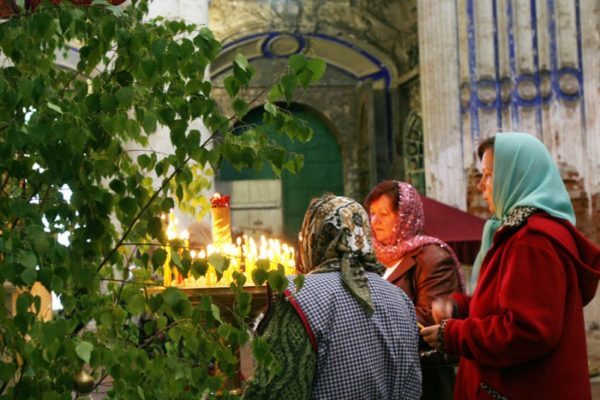And it shall come to pass in the last days, saith God, I will pour out of my Spirit upon all flesh: and your sons and your daughters shall prophesy, and your young men shall see visions, and your old men shall dream dreams.
We have all heard these words of the Prophet Joel, quoted by St. Peter on this great day of Pentecost, many times before. And yet it seems that we do not truly believe them. Yes, we may perhaps believe intellectually that there are such things as prophets and saints; we may believe that there have truly been holy men and women, filled with the Spirit of God, who have walked this sinful earth. But that is not what the Prophet said; even in olden times, before the coming of Christ, there yet arose — from time to time — prophets and visionaries and dreamers and saints. So let us listen again to the words prophesying the great and terrible day which we now once more celebrate: “‘In the last days,’ saith God,’ I will pour out of My Spirit upon all flesh.’”
Upon all flesh. Not longer upon a select few only, no longer only upon those who have attained to the absolute heights of purity and righteousness, but now even upon us ordinary sinners also — provided only that we, through the Mysteries of Baptism and Chrismation, are numbered among the people of God.
The proclamation of the Gospel is bold, yet certain: on this day, Christ has made us poor and wretched sinners into gods (not by nature, but rather by grace). The Lord went to His voluntary and life-giving Passion “that they all may be one; as thou, Father, art in me, and I in thee, that they also may be one in us.” But, my brothers and sisters, do we believe these words that Christ spoke? Do we believe that He truly succeeded in His divine mission? Do we believe that each and every one of us who has been baptized and chrismated now partakes, in very truth, of the same superabundance of grace which was first poured forth upon the holy disciples and apostles two thousand years ago? If any of us doubts, then let him hear the astonishing proclamation of Christ: “Verily, verily, I say unto you, He that believeth on me, the works that I do shall he do also; and greater works than these shall he do; because I go unto my Father.”
Let none of us lament that we were not among the holy disciples and apostles during the days when Christ walked among them in the flesh. The Lord Himself testified, saying: “I tell you the truth; it is expedient for you that I go away: for if I go not away, the Comforter will not come unto you; but if I depart, I will send him unto you.” When He ascended, the Lord did not leave us orphans. He did not abandon us, nor did He deprive us of Himself, but rather bestowed upon us a great gift, as St. Augustine teaches: He withdrew from our bodily sight so that we might learn to look for Him nowhere other than within our own heart. For as Christ said: “at that day” — the day which we once again now celebrate — “ye shall know that I am in my Father, and ye in me, and I in you.”
Before the coming of the Holy Spirit on this day, the Lord gave to His disciples a final commandment before His Ascension into Heaven: “tarry ye in the city of Jerusalem, until ye be endued with power from on high.” He commanded them to abide in the Holy City, waiting for the coming of the power of God.
But as for us, dear brothers and sisters: what is it that we are waiting for?
Because all too often we wait around, standing idle, burying the talent which our Lord has given us. We put off repentance, we put off spiritual labor, we put off proclaiming the Gospelto those around us — though we see them each day, like the prodigal son, perishing with hunger before our very eyes.
I ask again: what are we waiting for?
Open the pages of Holy Scripture and see how mighty were the labors of those who lived before the coming of Christ: see the righteousness of Noah, the faith of Abraham, the intercession of Moses, the love of David, the zeal of Elias, the steadfastness of Daniel and the Three Holy Youths. Consider the lives they led even before Christ came and raised up our fallen nature, vanquished sin, demolished the power of death, ascended in our own flesh to stand at the right hand of God, and filled our hearts to overflowing with the grace of the Most Holy Spirit. But what of us, for whom all this has already been accomplished? We walk about in a daze, half-hearted and double-minded, calling ourselves Christians but living like men and women of the world, having “an appearance of godliness, but denying the power thereof.”
I ask yet again: what are we waiting for?
Perhaps we think that we are too weak or too sinful. Perhaps we are waiting for the Lord to suddenly transform us into saints and to bestow upon us all perfection, notwithstanding the laxness and lukewarmness of our lives. But even so great a struggler as St. Paul was not vouchsafed perfection in this life, but instead was told: “My grace is sufficient for thee: for My strength is made perfect in weakness.”
So I ask one final time: what are we waiting for?
On this day, the great day of Pentecost, Christ has given us everything and done for us everything: He has freed us from sin, resurrected us from the dead, and bestowed upon us His own Most-Holy Spirit. If there were anything else that God could do, He would have done it. If there were anything else that God could give, He would have given it. Yet still we stand idle and waiting, as if there yet remains something more for us to receive, we who have already been given nothing less than God Himself: for “of His fulness have all we received, and grace for grace.”
Let us cease our waiting, my dear brothers and sisters. Let us no longer doubt the grace which Christ has poured out so richly upon us. Let us no longer bury our talent in the earth. Let us no longer make excuses. Let us no longer allow our sins and our weaknesses to hold us back, but let us say with St. Paul: “Most gladly therefore will I rather glory in my infirmities, that the power of Christ may rest upon me.” Let us take heed also to the words of that same Apostle:
We then, as workers together with him, beseech you also that ye receive not the grace of God in vain. (For he saith, I have heard thee in a time accepted, and in the day of salvation have I succoured thee: behold, now is the accepted time; behold, now is the day of salvation.) Giving no offence in any thing, that the ministry be not blamed: but in all things approving ourselves as the ministers of God, in much patience, in afflictions, in necessities, in distresses, in stripes, in imprisonments, in tumults, in labours, in watchings, in fastings; by pureness, by knowledge, by long suffering, by kindness, by the Holy Spirit, by love unfeigned, by the word of truth, by the power of God, by the armour of righteousness on the right hand and on the left, by honour and dishonour, by evil report and good report: as deceivers, and yet true; as unknown, and yet well known; as dying, and, behold, we live; as chastened, and not killed; as sorrowful, yet alway rejoicing; as poor, yet making many rich; as having nothing, and yet possessing all things.
And finally, let us resolve within ourselves to believe with all our hearts the sermon given by St. Peter on this great day of Pentecost, and to proclaim it anew with every thought and word and action of our lives:
Repent, and be baptized every one of you in the name of Jesus Christ for the remission of sins, and ye shall receive the gift of the Holy Spirit. For the promise is unto you, and to your children, and to all that are afar off, even as many as the Lord our God shall call.
Amen.

















